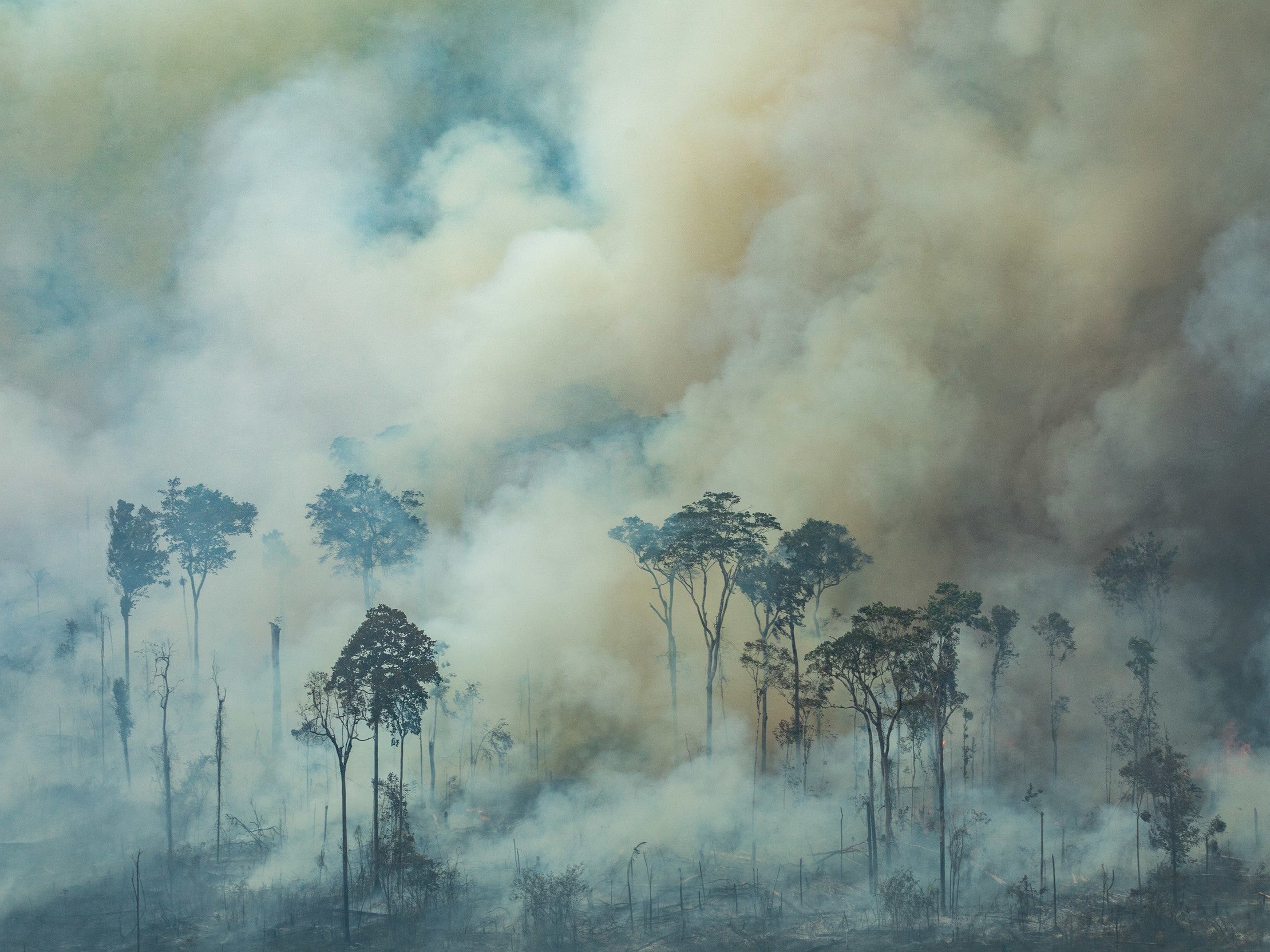
Forest fires happen annually in the Amazon as a result of forest life cycles, but this year the Amazon rainforest is burning at 84% the rate it did last year, according to the Brazilian Space Agency.
Rainforest Alliance chief programme officer Nigel Sizer adds that “NASA clarified the fires are worse than anything they’ve seen since 2012”.
This fact, and associated dramatic images of fires decimating huge swathes of what French President Macron has referred to as the “world’s lungs” and dispersing smog over Brazilian cities, have captured and outraged the world since the middle of August.
Interestingly, widespread awareness of the Amazon’s predicament was facilitated primarily by social media; traditional media outlets were slower to draw attention to the issue.
Distraction of mainstream media by other events
“Why traditional media didn’t take note of the fires earlier…[has] actually been one of my big questions,” Wilson Centre Brazil Institute associate Anna Prusa muses.
She notes a few weeks before the surge in fires was starting to be noticed on social media, “a half dozen of the major newspapers in the world all carried incredibly critical stories on the Amazon and deforestation”.
How well do you really know your competitors?
Access the most comprehensive Company Profiles on the market, powered by GlobalData. Save hours of research. Gain competitive edge.

Thank you!
Your download email will arrive shortly
Not ready to buy yet? Download a free sample
We are confident about the unique quality of our Company Profiles. However, we want you to make the most beneficial decision for your business, so we offer a free sample that you can download by submitting the below form
By GlobalDataHowever, “in the intervening weeks, other international issues [took precedence]”, most notably Brexit under new Prime Minister Boris Johnson and the revival of the US-China trade war.
Sizer agrees: “The mainstream media is obsessed with the political dynamics of the moment, these are distracting from some of these incredibly serious long-term issues.”
Brexit has already proven to be a distraction yet again, particularly for the UK’s media outlets following Boris Johnson’s decision to ask permission to prorogue parliament.
How have the Amazon fires grasped the world’s attention?
Conversely, on social media “there is space for a much greater range of issues” to circulate simultaneously, Sizer comments. This allows growing public interest in climate change to remain near the top of the agenda, despite simultaneous outpouring of frustration about other political issues.
According to Sizer, “there is a heightened awareness about global warming across the world,” which is exemplified by the strange weather being seen recently: “heat waves across Europe, stronger tropical storms”.
Importantly, Sizer notes two points that are key to understanding why social media so successfully galvanised anger about the Amazon fires in 2019.
First is how “young people are extremely concerned about climate change and the environment”, more so than previous generations because “they are the ones who are going to be saddled with cleaning up this mess as it further deteriorates”, and second, they are also the ones primarily using social media to access current affairs.
This millennial outrage has been facilitated by celebrities publicising the issue to their millions of followers.
Another reason the Amazon fires are particularly suited to social media are the power of images of the fires; they are “incredibly evocative and effective,” generating a “sense of loss” and rousing action, according to Prusa.

Importance of high-profile political squabbling
Heightened concern about environmental issues was successfully combined with global concern about Brazilian President Bolsonaro’s attitude towards the Amazon, and therefore heightened focus on the consequences of his actions. Prusa claims “The fires have been a visible symbol” of how badly President Bolsonaro has treated the Amazon.
The dramatic increase in forest fires this year in the region has primarily been attributed to Bolsonaro’s policy of focusing on “development and exploitation of attractive land in the Amazon,” as Prusa mentions, which has encouraged cattle ranchers and farmers to use fires to clear land for cattle grazing and agriculture.
The Brazilian President’s outspoken, aggressive responses to the public outcry has only added fuel to the fire. Prusa explains “the drama of [the]..back and forth” between Bolsonaro and Macron was “perfectly designed to stay on top of social media,” particularly since it is combined with an “issue that is incredibly important and terrifying”.
Sizer comments that the political dynamics are crucial to explaining the outrage on social media:
“In 2014 I was in the midst of a rather similar situation in Indonesia, which was actually more serious in some ways from what we’re seeing in Amazon. There was a lot of global media attention, it was a big story in social media, but we didn’t see anything like these sorts of dynamics.”
Transforming awareness into action
While President Bolsonaro engaged in a personally derogatory, verbal tussle with French President Emmanuel Macron about accepting $22m from the G7 countries – it still remains unclear if he will accept this aid – individuals were donating to charities, such as the Rainforest Alliance.
Sizer notes they had raised more than $500,000 from Instagram since the breaking of the story; $75,000 came directly through Rainforest Alliance’s Instagram stories. Half a million dollars has now been transferred to five organisations on the ground in Brazil.
Sizer comments the total charitable donations, particularly through Leonardo diCaprio’s partnership with the Earth Alliance, probably now matches the G7’s commitment. The majority of the millions collected in charitable donations so far is being used on the ground to put out the Amazon fires, “while not a penny of the G7 money is anywhere near reaching Brazil.”
He adds: “We’ll see how that [the politics] develops, meanwhile, we’re getting something done with the help of social media and getting money out to people in the field”, suggesting social media has stepped in where high politics and government aid has failed.

Galvanising Brazilians to protest and lobby
Additionally, social media has been imperative in galvanising Brazilians into protesting about their President. “The protests in Brazil is they really took off after the international outcry,” Prusa notes.
“It’s interesting the way Brazilians relate to the Amazon; obviously, there are 25 million people living in the Amazon area, but for many Brazilians in Sao Paulo and Rio and other big city centres, the Amazon is something far away, just like it is for you or me [in the UK and the US].”
They are much more concerned about the issues that affect their immediate lives – economic recession, unemployment, general political chaos in the country – but “there was such a huge outcry internationally, and all this information started coming out, and many Brazilians, all of a sudden saw what was happening and realised that this was important.”
This general upset in Brazil, which seems to have taken the Bolsonaro government by surprise, has been coupled with certain lobbies starting to put pressure on the Brazilian government to change course. Social media has caused threats and “spontaneous calls for boycotts of Brazilian products in Europe and elsewhere”, rattling the country’s agricultural sector, according to Sizer.
Also, Bolsonaro is under pressure from the “governors of Brazilian provinces in the Amazon” to accept external assistance and take note of the seriousness of the situation in the rainforest.
Can social media cause long term policy change?
Although Prusa notes the importance of social media in the short-run, particularly “tackling the forest fires this year”, she adds: “The challenge is how do you sustain that?” and change how Brazilian in the agriculture and farming industry view the Amazon as a resource.
Prusa emphasises that “you have to figure out a way to make the Amazon itself an engine of economic growth as it stands,” however, “this government seems to lack the political will or interest,” as they see “development and environmentalism as fundamentally opposed”.
This suggests it is unlikely that social media outrage against the Amazon fires will dramatically alter Bolsonaro’s policy towards deforestation and destruction of the Amazon.
In fact, Prusa notes that continuing international pressure regarding the Amazon may have the opposite effect of its aim. This is because Brazilians are very defensive about the Amazon – they see it as belonging to Brazil, not the whole world – and so statements about it being “the world’s lungs” may cause a “hands off” and butt out attitude.

Separating fact from fake news
Sizer adds that despite progressive softening of Bolsonaro’s stance on the fires, he continues to make “disparaging comments about indigenous and NGOs,” who he originally blamed for starting to the fires to raise money.
Fake news has not just been perpetuated by Tropical Trump, it has also been seen on social media.
“We’ve seen a lot of photos being shared that are of forest fires in the Amazon many years ago or weren’t even taken in the Amazon,” says Prusa. “There was a photo being shared of an elephant on fire, and there are no elephants in South America. I read that there was a burned rabbit that was shared, and that was from forest fires in California.”
She is concerned that his misinformation phenomenon caused people to distrust everything else they have seen about the Amazon fires.
“There’s this danger that people will see real images of what’s happening, and they’ll discount it or they’ll say ‘Oh, I saw something like that the other day, and it was fake’.”
Remember Brazil isn’t the only country dealing with Amazon fires: spotlight on Bolivia
Primarily due to Bolsonaro’s role in social media’s preoccupation regarding the Amazon fires, a fascinating element of has been the laser focus on Brazil. However, Brazil is not the only country in South America with territory in the Amazon that is on fire.
Bolivia, for example, as a whole is almost 50% composed of the Amazon rainforest and the country is tackling its own forest fires. These fires have not spread from Brazil to Bolivia, instead they are caused by national policies similar to those in Brazil. Socialist, ethnically indigenous President Morales has encouraged farmers and cattle ranchers to use fires to clear land in the Bolivian Amazon regions; this is primarily to produce meat and crops for the Chinese market.
Like Bolsonaro, Pan-Amazon organisation Coica, has accused Morales of environmental genocide for his policies towards the rainforest.
Sizer acknowledges “the situation there [in Bolivia] is very serious”; he notes that Morales is calling for aid, saying that they will accept any help in contrast to Bolsonaro, although some help is provided, this is not on the scale of Brazil as it is “getting a fraction of the attention we’re seeing on Brazil”.
This begs the question, has social media domination of the narrative about the fires, combined with its preoccupation with Bolsonaro and Brazil, hindered efforts to genuinely tackle the issue of forest fires across the entire Amazon and the countries it encompasses?
Read more: How Brazil’s ‘Tropical Trump’ has copied the US President’s social media approach






